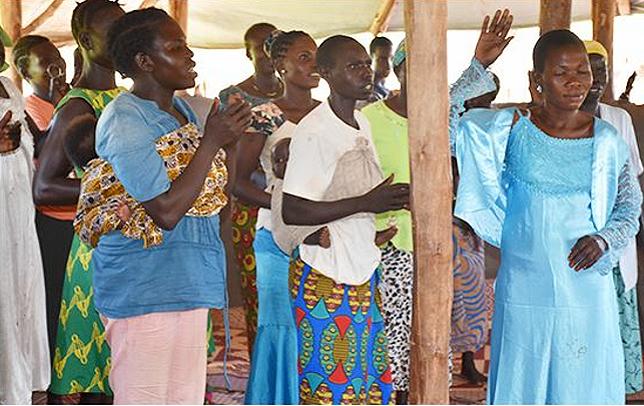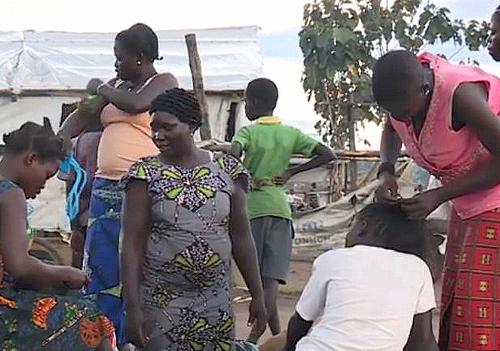Guided Self-help Eases Refugees’ Distress

South Sudanese women at the Rhino Camp in Uganda enjoy a safe space that they have built for themselves. (Photo by Rebecca Walker courtesy MAF Flying for Life) Posted for media use
By Sunny Lewis for Maximpact
GENEVA, Switzerland, January 28, 2020 (Maximpact.com News) – A guided self-help approach that offers strategies for managing distress and coping with adversity is safe, and resulted in meaningful improvements in functioning compared to enhanced usual care in female refugees living in a settlement in Uganda, according to a randomized trial involving nearly 700 South Sudanese refugee women, published in the journal “Lancet Global Health.”
The study is the first randomized trial of a guided self-help group intervention in a low-resource humanitarian setting. Although longer follow-up is needed to determine the long-term effects of the intervention, the authors say that guided self-help could be a promising strategy to address the vast gap in mental health support in areas where humanitarian access is difficult, such as South Sudan and Syria.
Refugees are at greater risk than the general population of developing symptoms of common mental disorders and other forms of disabling psychological distress.
Since December 2013, brutal conflict in South Sudan has claimed thousands of lives and driven some four million people from their homes. While many remain displaced inside the country, more than 2.5 million have fled to neighboring countries in a desperate bid for safety.
Countless South Sudanese women are victims of sexual and gender-based violence but cannot speak openly about their experiences. Many are also unable to read or write.
At the Rhino Camp settlement in north-western Uganda, women have built a Livelihood Protection Shelter, an open-sided structure which provides a safe space where women can meet, twice a week, to begin the slow healing process. It’s a first step on a long road to physical, mental and spiritual recovery.
Although several psychological treatments have been shown to be effective among conflict-affected populations, they tend to target single mental disorders, require a substantial clinical workforce, and reach only individuals or small groups of people at a time.
Self-Help Plus (SH+) was developed by the World Health Organization (WHO) to meet the challenges of delivering evidence-based mental health support to large numbers of people both with and without mental disorders in hard-to-reach conflict- or disaster-affected areas.
SH+ is a group-based self-help intervention guided by non-specialist facilitators with minimal training. It combines a five-session pre-recorded audio course with an illustrated self-help book designed for low literacy populations and can be delivered to groups of up to 30 people.
SH+ provides strategies for managing distress arising in the context of a range of adversities including interpersonal violence, armed conflict, and chronic poverty.
“The approach is based on acceptance and commitment therapy, a modern form of cognitive‐behavioral therapy, that focuses on increasing psychological flexibility – primarily through mindfulness exercises – and promotes behaviors that are in line with a person’s values,” explains Dr. Wietse Tol from Johns Hopkins Bloomberg School of Public Health and HealthRight International, USA, who co-led the research.
Co-lead author Dr. Mark van Ommeren from WHO in Geneva, Switzerland, said, “By targeting psychological distress, regardless of whether people have mental disorders, while reducing reliance on scarce specialists and tripling the number of participants reached per session, guided self-help has enormous potential to improve reach and access to psychological support for people affected by adversity.”

South Sudanese refugee women groom themselves at Rhino Camp in Uganda. (Screengrab from video courtesy UNHCR) Posted for media use
The study included 697 female refugees from South Sudan with at least moderate levels of psychological distress living in the Rhino Camp settlement in north-western Uganda.
Researchers randomly assigned 14 villages in the settlement to either SH+ in addition to enhanced usual care or enhanced usual care alone.
In the seven intervention villages, 331 women from randomly selected households received five weekly two-hour audio-recorded group-based sessions (20–30 refugees) delivered by briefly trained lay facilitators supporting group discussions and demonstrating exercises, complemented by an illustrated self-help book that summarized key concepts of the course.
The intervention group also received enhanced usual care consisting of one 30-minute group psychoeducation session about how to self-manage distress and information on how to access existing mental health services.
In the seven control villages, 363 women from randomly selected households received enhanced usual care alone.
No psychiatric diagnosis was required to be included in the trial, but participants assessed to be at imminent risk of suicide or showing observable signs of severe mental disorder were excluded and offered alternative support.
All participants completed questionnaires to assess their levels of psychological distress and to measure changes in symptoms of distress, depression and post-traumatic stress disorder (PTSD), self-reported concerns, inter-ethnic relations, feelings of anger, functional impairment, and subjective wellbeing one week before the intervention, and one week and three months after the intervention had ended.
On average 83 percent of the women in the SH+ group participated in each session, which suggests that SH+ is acceptable to participants.
Compared to the control group, refugees in the SH+ group reported substantially greater reductions in psychological distress both immediately after the intervention and three months later.
At the three-month follow-up, SH+ also led to improvements in PTSD and depression symptoms, explosive anger, functioning, and subjective well-being, and was equally beneficial among women with different trauma histories, levels of distress, and levels of exposure to gender-based violence.
Further analyses found that the vast majority of participants (84 percent) rated their psychological distress as severe at the start of the study.
Immediately after the intervention, women in the SH+ group were less likely to report severe levels of distress compared with the control group (33 percent vs 48 percent), and improvement in severe distress levels was maintained for three months.
There were no reports of any adverse reactions related to SH+ after scrutiny by an independent data safety management board.
Despite these achievements, the study has some limitations. By randomizing a limited number of villages, differences in unmeasured factors between the villages may have influenced the results; and the generalizability is limited to female refugees.
Further adaptation and evaluation for male refugees is currently ongoing.
“Our findings indicate that SH+ offers sizeable immediate benefits, which is very promising for an intervention that has high potential for scale-up, and can be delivered in areas with limited access to care,” says co-author Marx Leku from HealthRight International in Uganda.
Co-author Dr. Claudia Garcia Moreno from WHO, Switzerland observes, “There are still critical questions left to answer, including why effect sizes reduce over time; whether benefits can be maintained by integrating SH+ into existing humanitarian programs related to poverty, gender-based violence, or other community health concerns; and whether this approach is cost-effective compared with established psychological interventions.”
Discussing the findings, Dr. Charlotte Hanlon from Kings College London, UK, who was not involved in the study, says that the study has “taken global mental health to a new and hopeful place.”
“The question now is how can this promising and potentially scalable intervention be transitioned to make real-world impact?” asked Hanlon.
Hanlon concludes, “The mechanisms of action of the intervention should be further investigated, particularly to understand how to achieve greater psychological flexibility…[so] that the intervention can be offered to all populations facing serious adversity, without the need to screen.”
This study was funded by the Research for Health in Humanitarian Crises Programme. It was conducted by researchers from Johns Hopkins Bloomberg School of Public Health, Baltimore, Maryland; HealthRight International, New York, New York and Arua, Uganda; WHO, Geneva, Switzerland; Arua Regional Referral Hospital, Uganda; University of New South Wales, Sydney, Australia; UN High Commissioner for Refugees, Geneva, Switzerland; University of Liverpool, Liverpool, UK in partnership with the Ministry of Health in Uganda.